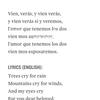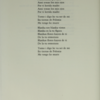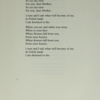6: Song lyrics and recording (1993), “Arvoles Yoran por Luvias/Trees Cry for Rain," and song lyrics, “En Tierras de Polonia/In Polish Lands,” 1945.
For Sephardic Jews in Europe, particularly in Greece and Yugoslavia, the Nazi occupation of Europe and its policy of exterminating Jews in the Holocaust hit particularly hard. Less than ten percent of the Jewish population of Salonica survived deportation and extermination. The overwhelming loss decimated the heartland of Sephardic life and Ladino culture.
Suggested Activities: Read the lyrics of these two songs side by side. “Arvoles yoran por luvias” is a traditional Ladino song, possibly dating from the sixteenth century post-expulsion Sephardic diaspora, while “En tierras de Polonia” is an adaptation of that same song created by concentration camp inmates during the Holocaust. Why would Ladino-speaking concentration camp prisoners organize a communal singing group? Why might they choose to adapt an old song into a new one expressing their grief and anguish? How does each version compare to “Adio Kerida” in tone and message? How is this song and the adaptation process similar to and different from the interpretation of “Adio Kerida” as a bittersweet ode to Spain?
Sources: "Arboles lloran por luvia," lyrics translated from Ladino by Isaac Nehama, on USHMM online.
"Arboles lloran por luvia," performed by Dr. Avram Sadikario, Skopje, 1993, recorded by Susana Weich-Shahak, from the S. Weich-Shahak collection in the National Sound Archives at the National Jewish and University Library in Jerusalem, online.
“En tierras de Polonia” in Isaac Jack Levy, ed. And the World Stood Silent: Sephardic Poetry of the Holocaust (Urbana and Chicago: University of Illinois Press, 1989), 212–213.
Arboles Lloran Por Luvia
 Download image (43.44 KB)
Download image (43.44 KB) En Tierras De Polonia
 Download image (377.69 KB)
Download image (377.69 KB) En Tierras De Polonia (English)
 Download image (383.65 KB)
Download image (383.65 KB)



